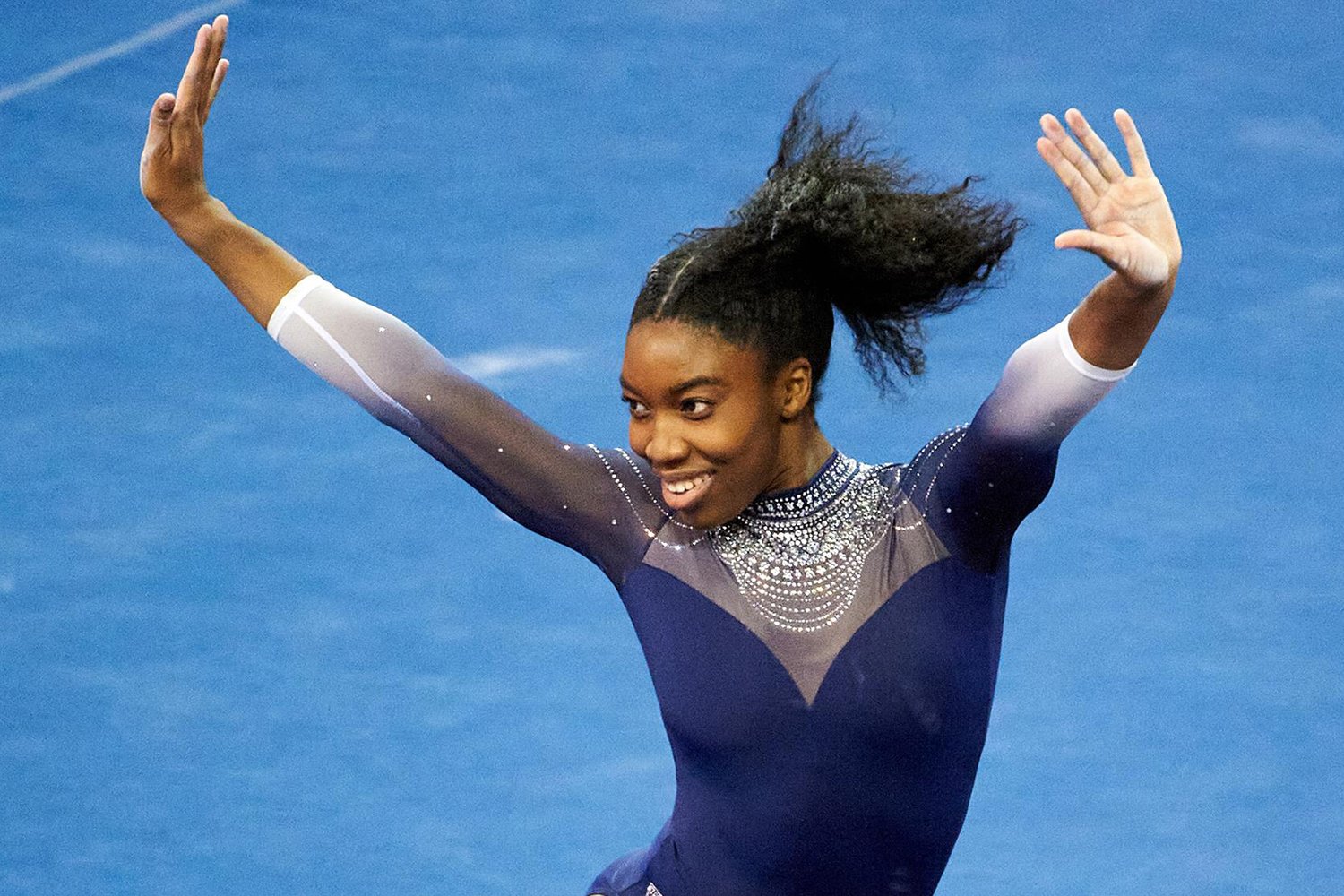Watch: UCLA Gymnast Chae Campbell Scores Perfect 10 With A Dancehall Floor Routine
A slew of Dancehall tracks from the 1990s, Sister Nancy’s 1982 track Bam Bam, and the Jamaican dance moves embedded in her routine, propelled UCLA gymnast Chae Campbell into American history books on Sunday after the second-year student received her first-ever perfect 10 score, using a Dancehall floor routine.
In addition to Bam Bam, her choreography in the competition against Washington, comprised Sean Paul’s Temperature and Get Busy, Murder She Wrote by Chaka Demus and Pliers, Wayne Wonder’s No Letting Go, which were heard prominently during the two-minute session.
Campbell, who was seen jumping in the air and celebrating with her teammates after the scores are posted on the monitor, later told POPSUGAR that she had attended a dance convention last summer and was “inspired by the talent, dance styles, and energy, which sparked the inspiration for this year’s routine.”
The 20-year-old said that along with Los Angeles based dancer and choreographer BJ Das, she brought in “some authentic Jamaican dance moves that are popular in the dance community.”
“I was so excited to bring a piece of that energy to the gymnastics world,” she said.
The 2016 U.S. junior vault champion’s routine also included Pon de Replay and What’s My Name by Rihanna, Never Leave You (Uh Oooh, Uh Oooh) by Lumidee, Rave De Favela by Major Lazer, Anitta, Cadence by Travis Lake and MC Lan featuring Papa San’s son BEAM and Move Ya Body by Nina Sky featuring Jabba.

Campbell’s choice of music brings back to full focus the argument that the original danceable Dancehall beats dating back to the 1980s, 1990s and early 2000s, are still in demand and being used for music synchronization, by even young American nationals who were not even born in those eras, as opposed to the Trap/Hip Hop/Island Pop sounds which continue to be shunned.
Many Dancehall connoisseurs have complained bitterly that Jamaican music is losing its lustre, as the sounds are hollow and they were unable to dance to Hip Trap/Trap beats, which appeared to have circumvented one of the world’s most influential genres.
In March last year, General Manager of the Jamaica Music Society (JAMMS) Evon Mullings, during an interview on Television Jamaica’s The Entertainment Report, affirmed that the international market was not buying into the new-era music coming out of Jamaica.
At the time, he said this was based on royalty payments he was seeing coming into the country, since deepening collection ties with UK-based Performance Rights Organization Phonographic Performance Limited (PPL).
Mullings had said that the songs raking in the dollars were the older, authentic productions dating back to the 1980s, 1990s and 2000s.
In addition, he had also said contemporary artists such as Shenseea, Vershon, Jahmiel and Ding Dong, who had stuck to the authentic Jamaican sounds, were the ones reaping the rewards.
Also, in November last year, Dancehall megastar Shaggy had advised his Jamaican musical compatriots to focus more on making records that can be utilized in music synchronization, (the use of parts of a song within movies, television shows, television and radio commercials, and video games), as these tracks have the potential to generate even more wealth for them.
And, in June last year, Sean Paul, who has made it his duty to analyze trends in music, had predicted that hardcore, authentic Dancehall riddims, for which Dancehall fans have been clamouring, were ‘coming full circle’ and that the world was ready once again, for those beats.
Track icon Usain Bolt, whose 90’s sounding Clockwork riddim had seen relative success, had also surmised that authentic-sounding Dancehall riddims were in demand, while Heads High singer Mr. Vegas had contended that the Hop Hop beats were watering down the genre, and that such songs were failing to “pass Norman Manley airport”.
He had told The Entertainment Report that artists who were voicing on Hip Hop beats were failing to make the grade as overseas audiences were not receptive to the imitation styles and that Dancehall songs from the 2000s dating back to the 1980s were still reigning supreme, simply because of the beat.
“As I said there is no sound as yet to replace the original authentic Dancehall, or the authentic Reggae sound. People still sampling the sound. People are still sampling Bam Bam by Nancy. People still a sample the old school Dancehall, so it comes down to the sound. The sound has not been replaced and I don’t think it will be replaced,” he argued.
The Nike Air artist had also argued that the biggest cross-over tunes out of Jamaica have been authentic Dancehall, among them Temperature, Gimme Di Light, and No Letting Go.
Vegas had also said that whilst he was not judging the new artists, who had a right to use whatever sounds they had seen as lucrative, they were at a stark disadvantage when it comes to crossing over in the US, as “when programme directors are selecting music for their playlist, because they are not gonna replace a Drake or a replace another major star for a Jamaican song that is Hip Hop as well”.
